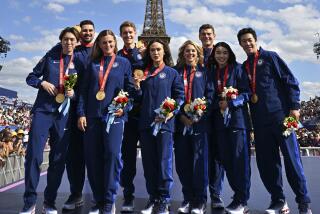U.S. men’s gymnasts do themselves proud
- Share via
Beijing
The post-Paul Hamm era began today for the U.S. men’s gymnastics team, and the transition from being a seasoned, pressure-tested squad to an eager group still exploring its potential went surprisingly well.
The U.S. men were given little chance of winning a team medal after Hamm, the 2004 Olympic all-around champion, withdrew from these Games because of hand and shoulder injuries. That small chance seemed to vanish after his twin brother, Morgan, withdrew last week because of a sore ankle.
But with first-time Olympians Jonathan Horton and Justin Spring aggressively leading the charge, the U.S. won a bronze medal and delighted the loud American contingent in the jam-packed National Indoor Stadium.
The defending world champion Chinese team, supported with cheers, flags and rhythmic chants, deservedly won the gold medal with 286.125 points. The Japanese team -- the defending Olympic champion -- was second with 278.875 points and the Americans third with 275.850.
“Absolutely a great, great day,” said Kevin Mazeika, the men’s head coach.
The U.S. men didn’t exactly come out of nowhere -- they had finished fourth at last year’s world championships, and Horton last year ranked fourth in the all-around competition.
Yet, their effort today qualifies as a revelation. They took their potential to another level by performing admirably under duress, ending with a superb pommel horse routine by the wildly inconsistent Alexander Artemev.
“That was a huge performance. Boy did he knock it out of the park,” Mazeika said, a cross-sports reference that could be excused in his post-medal giddiness. “We really needed that pommel horse routine and he hit it big time.”
In that regard the U.S. men succeeded at a gold-medal level, offering hope for a program that endured tough times after Athens -- including a 13th-place finish at the 2006 world championships -- and can now look forward with hope instead of looking wistfully back at the successful era identified with the Hamms.
On the medal stand, lined up side by side, they celebrated their achievement with wide smiles. Kevin Tan got his medal first, and an instant after the beribboned prize placed around his neck he pulled it upward for a closer look, almost in disbelief.
Spring, Horton and Joey Hagerty got their medals next, their relieved expressions saying more than their words could. Raj Bhavsar, an alternate four years ago, stood straight and tall after he got his medal, no doubt thinking of the years of work that went into that moment. Finally, Artemev, the second alternate who got a place on the team only after Morgan Hamm was injured but made the most of his opportunity today.
“After all we went through to get here, we did amazingly well,” assistant coach Miles Avery said. “All we said was ‘Be consistent. Be consistent.’ They did a tremendous job.”
The men had little margin for error today and didn’t commit many. Tan’s 12.775 on the final apparatus, the pommel horse, hurt. But their other sins were minor, mostly small hops on their dismounts.
Enough errors, certainly, to ensure they wouldn’t win gold. The Chinese men were too good, too precise, their skill levels too advanced to leave anyone else any hope. Their every move was greeted with thunderous applause, every decibel of it well merited.
But the U.S. men lacked nothing in nerve or heart, and that has to be encouraging for the years ahead.
“When you look at the guys that are out on the floor, these are the guys that have been fighting through the trenches the last three years on the international level,” said Steve Penny, president of USA Gymnastics. I think that they see this as their time and I think they’re ready to go out there and claim this.”
They put their signature on this competition with boldness and warm camaraderie.
When Horton finished his dazzling high-bar routine, his teammates literally jumped for joy. When Hagerty scored a team-low 14.625 on floor exercise, he shook that off to applaud Horton, who followed with a robust 15.575.
Bhavsar, who replaced Paul Hamm, was the glue. A veteran of the 2001 and 2003 teams that won silver at the world championships, he brought a confidence his teammates drew upon.
“Raj was tremendous,” Avery said. “We kept saying this was a team of nine and we almost needed them all. [Artemev] and Raj really came through.”
That they did. Horton won’t hear a “Who?” again. Spring has been sprung on the gymnastics world.
What they did today wasn’t golden, but it was gutsy and gritty and worth every bit of sweat and anxiety they all put into it. For the U.S. men, the bronze age is one to enjoy.
--
Helene Elliott can be reached at helene.elliott@latimes.com. To read previous columns by Elliott, go to latimes.com/elliott.
More to Read
Go beyond the scoreboard
Get the latest on L.A.'s teams in the daily Sports Report newsletter.
You may occasionally receive promotional content from the Los Angeles Times.







